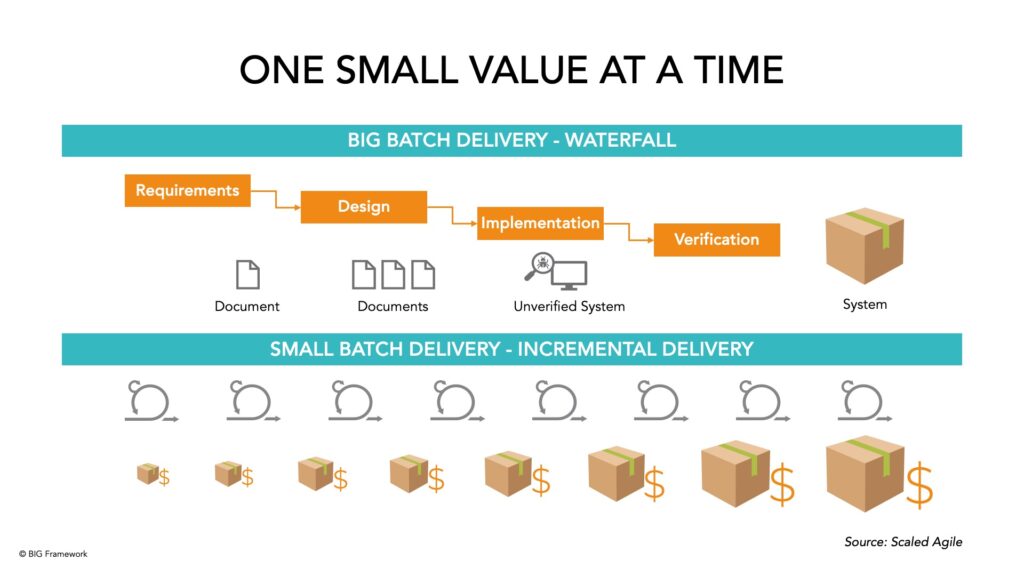Progress always involves risk
Now, perhaps more than ever before, successful business ownership involves risk taking. If you don’t embrace risk, you face the biggest risk of all, facing the same destiny as Kodak, Blockbuster or Nokia among many others.
“The most significant risk is not taking any risk.
In a world that’s changing quickly, the only strategy guaranteed to fail is not taking any risks.”
– Mark Zuckerberg, Founder of Facebook
Taking risks, however, does not mean going into business blindly and then expecting great results. Intelligent organisations take small risks and evaluate by taking an iterative approach, operating with small batches and fast feedback loops.
“Progress always involves risk.” These words echo the sentiment that has driven countless entrepreneurs and business leaders to venture into uncharted territories, embracing uncertainty in pursuit of growth and innovation. In the dynamic landscape of business, risk-taking isn’t just a choice; it’s a necessity for survival and success in today’s fast-changing marketplace.
“Progress always involves risk. You can’t steal second base and keep your foot on first.”
– Frederick B Wilcox
Risk-taking is a fundamental element that drives growth and profitability. While it may seem counterintuitive to associate risk with success, calculated risks are often the catalysts for breakthroughs and advancements in business.
Why risk-taking is essential in any business
Risk-taking empowers individuals and teams to push boundaries, challenge the status quo, and explore new opportunities. Here’s why embracing risk is crucial for business growth:
Fear of failure is the enemy of progress
Despite the potential rewards, many organizations are paralyzed by fear of failure or uncertainty. The fear of making mistakes or facing setbacks prevents them from seizing opportunities and realizing their full potential. However, as the saying goes, “Fortune favours the bold.” By reframing failure as a learning opportunity and embracing a mindset that celebrates experimentation and innovation, businesses can overcome the fear barrier and unlock new avenues for growth.
Look at failure as an opportunity to learn.
Modern organisations are willing to experiment with new ideas as they know it is vital for growth. They don’t always expect to succeed. Smart risk takers always look at failure as an opportunity to learn. You don’t utilize your full potential if you have not failed recently. If you avoid failure, you are chasing a false sense of security. Avoiding failure at any cost means you are stuck in a comfort zone however your comfort zone is no safe zone in a fast-changing world. Failing is part of any business, and it’s a poor strategy to avoid failure. Instead, learn how to fail forward and learn. The critical takeaway is to fail fast rather than big. When you adopt experimentation and an iterative approach to validate ideas quickly with the customer, you gain valuable information on what to persevere and what to pivot. Having a small batch mindset helps you reduce the risk and gain customer feedback faster, which helps you make better decisions.
Calculated risks are the path to success
While risk-taking inherently involves uncertainty, successful organizations understand the importance of taking calculated risks. Rather than blindly leaping into the unknown, they carefully assess potential risks and rewards, weighing the potential outcomes before making decisions. By combining intuition with data-driven analysis, businesses can minimize downside risks while maximizing upside potential, ensuring that their ventures are grounded in strategic foresight rather than blind optimism.
The longer your time to market (TTM) is the higher the risk you take. You take much higher risks spending 2-3 years on a project before getting any customer feedback than delivering iteratively in small batches as the picture shows. Delivering iteratively reduces the risk by reducing the TTM so you can get faster feedback and course correct when needed.

Innovation cannot happen without risk
In today’s fast-paced business environment, staying stagnant is a recipe for obsolescence. Companies that are unwilling to take risks and innovate are likely to be left behind by more agile and forward-thinking competitors. Modern organisations create a culture of experimentation and adaptability, where failure is seen not as a setback but as a stepping stone towards improvement and innovation.
At the heart of every successful endeavor lies a willingness to take risks. Whether it’s launching a new product, entering a new market, or adopting disruptive technologies, progress cannot occur without venturing beyond the safety of the status quo. Just as a ship cannot reach new horizons without leaving the safety of the harbor, businesses cannot achieve breakthroughs without taking calculated risks.
Risk is directly connected to opportunity
Growth opportunities often come disguised as risks. Whether it’s entering new markets, launching innovative products, or adopting disruptive technologies, seizing these opportunities requires a willingness to embrace uncertainty and venture into the unknown. Companies that shy away from uncertainties miss out on potential expansion and revenue generation avenues, ultimately limiting their growth potential.
Customers have constantly changing demands. For this reason, businesses should be in a constant state of progress. Organisations must not think they know what customers want or need, as this is not constant. Instead, they must continuously test and verify how their customers’ behaviour changes over time and be willing to adapt to stay in tune with what their customers want and need. This means operating with a willingness to continuously evolve ways of taking new or improved solutions to market.
Risk-taking provides a competitive advantage
Many tend to avoid risk; those who are brave enough to take risks already have a competitive advantage. They set the pace and lead from the front with new ideas, fresh offers, and bold inventions. Risk takers are the most adept at pivoting when the going gets tough.
Attracting top talent and fostering creativity
Risk-taking appeals to ambitious and innovative individuals who thrive on challenges and opportunities for growth. By fostering an environment where creativity and experimentation are valued, organisations can attract and retain the brightest minds in their respective fields, driving continuous innovation and competitive advantage.
Risk-willing and innovative organisations attract the best employees.
Learn to take calculated risks
You can achieve what risk takers achieve by adopting a business agile approach using proven systems that help you take calculated risks through adopting iterative delivery in small batches and gaining fast customer feedback.
Resilience and agility are essential traits for survival in an increasingly volatile and unpredictable business landscape. Companies that embrace risk-taking develop resilience to weather challenges and setbacks, adapting quickly to changing market conditions and emerging trends. By embracing risk as an inherent part of business, organisations become more agile and responsive, better equipped to navigate uncertainty and capitalize on opportunities as they arise.
Reflection:
Do you know how to take calculated risks that give your organisation an advantage?
Key takeaways
In today’s rapidly changing business landscape, the only constant is uncertainty. Rather than fearing the unknown, successful organizations embrace it as an opportunity for growth and innovation. Progress always involves risk. Risk-taking is essential for driving growth, innovation, and competitiveness in business. By adopting a mindset that views risk as a necessary catalyst for progress, businesses can navigate uncertainty with confidence and chart a course towards long-term success.
Would you like tools that help you take calculated risks?


